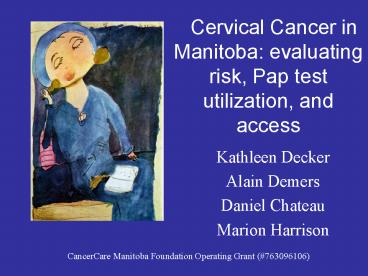Kathleen Decker - PowerPoint PPT Presentation
1 / 15
Title:
Kathleen Decker
Description:
Compare the risk of invasive cervical cancer among women who received regular ... cancer or any other malignant neoplasm excluding non-melanoma skin cancer. ... – PowerPoint PPT presentation
Number of Views:31
Avg rating:3.0/5.0
Title: Kathleen Decker
1
Cervical Cancer in Manitoba evaluating risk,
Pap test utilization, and access
- Kathleen Decker
- Alain Demers
- Daniel Chateau
- Marion Harrison
CancerCare Manitoba Foundation Operating Grant
(763096106)
2
Objectives
- Compare the risk of invasive cervical cancer
among women who received regular Pap tests and
those who received irregular or no Pap tests. - Determine if cases and controls had the same
opportunity to be screened.
3
Objectives
- Determine if there is a relationship between
physician characteristics and the probability of
a woman being screened. - Determine if tumour stage at diagnosis depends on
screening history. - Calculate the possible reduction in risk of
cervical cancer if all Manitoba women were
screened regularly.
4
Data Sources
- Manitoba Cancer Registry (MCR)
- Manitoba Health Insurance Plan Registration File
(MH Population Registry) - Manitoba Physician Claims Database
- Physician Master File
- 1996 Canadian Census
- Cervical Cancer Database
5
Method
- Case control study.
- 678 cases diagnosed between 1989 and 2001 were
matched to 3378 controls by age at diagnosis and
area of residence. - Women had to be at least 18 years of age.
- Controls had no history of cervical cancer or any
other malignant neoplasm excluding non-melanoma
skin cancer. - All cases and controls had at least 5 years of
coverage by Manitoba Health prior to diagnosis
date.
6
- Results Risk of cervical cancer and rate of Pap
tests - Between 1989 and 2001 (the whole study period)
- The rate of Pap test was 17 higher amongst
control than cancer cases.
N OR 95 CI
Never had a Pap test 1500 2.77 2.30 - 3.30
Ever had a Pap test 2570 1.00 --
10,000 income increase 0.78 0.69 - 0.89
Urban 2851 0.49 0.23 - 1.07
Rural 1219 1.00 --
7
- Results Risk of cervical cancer in relation to
Pap test regularity - Women screened regularly - at least one Pap
test every 3 years. - Analyses were restricted to the 5-year period
before diagnosis.
OR 95 CI
Pap test regular 0.47 0.39 - 0.57
Other (irregular / none) 1.00 --
10,000 income increase 0.85 0.79 - 0.91
8
- Results Rate of Pap test
- We looked at the rate of Pap test within the 5
year preceding the diagnosis dates of cases. - The mean number of Pap tests for cases was 0.87.
- The mean number of Pap tests for controls was
1.38.
N RR 95 CI
Controls 3391 1.57 1.44 - 1.73
Cases 679 1.00 --
Age increase (10-yr steps) 0.80 0.78 - 0.81
10,000 income increase 4070 1.06 1.04 - 1.07
Urban 2851 1.22 1.15 - 1.30
Rural 1219 1.00 --
9
Results Tumour Stage (FIGO) and Regular
Screening
Tumour stage for 460 cases 272 (59) stage I 95
(21) stage II 71 (15) stage III 22 (5)
stage IV
Tumour Stage OR 95 CI
Not screened regularly 1 1.00 - -
2 2.14 1.26 3.63
3 8.71 3.56 21.32
4 1.70 0.61 4.76
10
Method Opportunity to be screened
- An opportunity to be screened was defined as any
physician visit within the 5 years preceding the
diagnosis date of the case excluding the 6 months
prior to diagnosis. - All physician visits up to 10 months after a Pap
test were not considered another opportunity to
be screened.
11
Results Rate of physician visits (opportunity
to be screened) Within the 5 year period
preceding a cancer diagnosis Cancer cases had a
mean number of 17.8 visits/opportunities. Controls
had a mean number of 18.3 visits/opportunities.
RR 95 CI
Controls 1.04 0.96 - 1.12
Cases of cancer 1.00 --
Age (10-yr steps) 1.20 1.18 - 1.22
10,000 income increase 0.94 0.92 - 0.95
Urban 1.02 0.96 - 1.09
Rural 1.00 --
12
Results Physician Characteristics
We examined the probability of having a Pap test
in the 5 years prior to diagnosis by physician
characteristics.
Entire data set OR 95 CI
Rural GP 0.81 0.77 0.85
Obstetrician/gynecologist 6.35 6.03 6.68
Sub set (55)
Canadian graduate 1.22 1.16 1.28
Graduation year 1.36 1.20 1.54
Female 1.67 1.59 1.76
13
Results Risk reduction
- We calculated the possible reduction in the
number of cervical cancer cases for the year 1999
if all women had been screened regularly. - We assumed that the rate of regularity among
controls was the same as the general population
and that all of the population was regular. - Regular screening was defined as at least one Pap
test every 3 years.
14
- Results Risk reduction
- There were 51 cases of invasive cervical cancer
in Manitoba in 1999. - If all women were screened regularly, there
would have been 34.4 cases. - 51 34 cases 17 fewer cases (33).
15
- Conclusions.
- Implications for program delivery.
- Expanded analysis.































